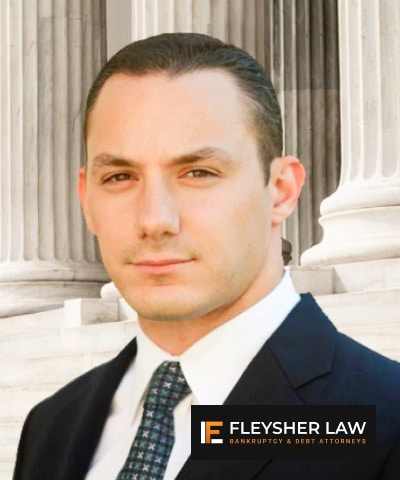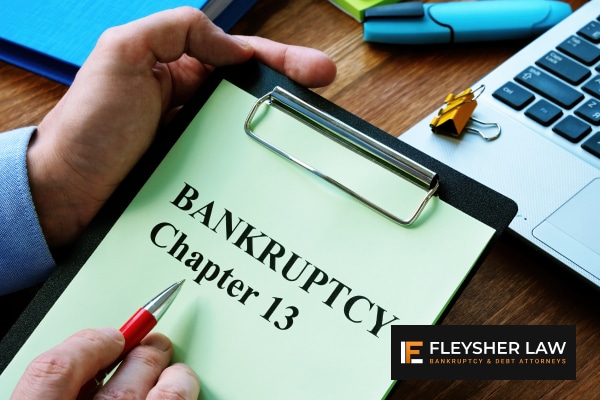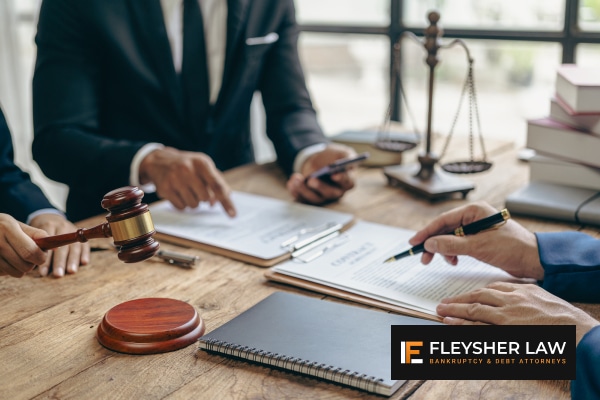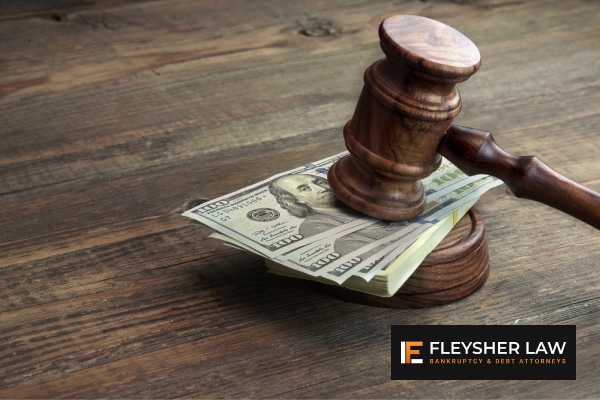This page was written, edited, reviewed & approved by Emil J. Fleysher following our comprehensive editorial guidelines. Emil J. Fleysher, the Founding Partner, has 15+ years of legal experience as a bankruptcy attorney. Our last modified date shows when this page was last reviewed.

Filing for bankruptcy is a major decision that affects your financial future, and choosing the right path is crucial. In Port Saint Lucie, Chapter 13 bankruptcy offers individuals a way to handle debt through a structured repayment plan.
At Fleysher Law, our dedicated Chapter 13 bankruptcy lawyers are committed to guiding you through this complex process. We offer personalized legal strategies to protect your assets and help you regain financial stability.
Understanding Chapter 13 bankruptcy and its implications can help you decide if it's the right option for you. Our Port Saint Lucie Chapter 13 Bankruptcy Lawyers are here to explain the benefits and requirements of Chapter 13 bankruptcy. Let our knowledgeable bankruptcy attorney advocate for your rights and needs.

Our Port Saint Lucie Chapter 13 bankruptcy lawyer specializes in helping individuals work through the nuances of bankruptcy law. We know that each client's situation is unique, and we tailor our legal advice to meet your needs. Our team strives to ensure that you know all your choices and the steps involved in filing for Chapter 13 bankruptcy.
We are dedicated to offering support throughout the entire bankruptcy process. Our lawyers stand by your side from the first consultation to the last debt discharge. We aim to help you achieve a fresh financial start, allowing you to move forward confidently.
Trust our expertise to guide you through each Chapter 13 bankruptcy case step. Reach out to us for help with your bankruptcy case.
Chapter 13 bankruptcy, often called a wage earner's plan, allows individuals with regular income to craft a plan to repay all or part of their debts. With this type of bankruptcy, individuals propose a repayment plan to pay installments to creditors for three to five years. This option is ideal for those who have valuable assets they wish to keep, which might otherwise be forfeited in a Chapter 7 filing.
Chapter 13 provides a structured path toward debt relief, allowing you to keep your property. It's designed to give you a financial rebirth, protecting you from creditors' collection efforts while you work through your repayment plan. This type of bankruptcy can also stop foreclosure processes, allowing you to catch up on missed mortgage payments.
Qualifying for Chapter 13 bankruptcy requires having a regular income high enough to support a monthly payment plan.
Your total debt must also not exceed certain limits; as of 2021, unsecured debts must be less than $419,275, and secured debts must be less than $1,257,850. These figures are adjusted periodically to reflect changes in the consumer price index.
Individuals facing high amounts of debt but still earning a steady income often find Chapter 13 to be a suitable option. It allows them to reorganize their finances without the severe effects of liquidation.
Our team at Fleysher Law can help determine if Chapter 13 bankruptcy is the proper choice for you based on a detailed analysis of your financial situation.

Chapter 13 bankruptcy starts with filing a petition in the bankruptcy court serving the area where you live.
Once you file, the court places an automatic stay on most collection actions against you and your property. This stay occurs the moment you file the bankruptcy petition, which means creditors must cease foreclosure actions, garnishments, and all collection activity.
Developing a repayment plan is a critical component of Chapter 13 bankruptcy. This plan outlines how you will repay your debts over three to five years. Your plan must be approved by the court and is overseen by a bankruptcy trustee who distributes payments to creditors.
The bankruptcy court is critical in overseeing your Chapter 13 case. The judge will confirm your repayment plan and ensure it meets the bankruptcy code requirements.
A trustee is appointed to administer the case, collect payments from you, and distribute them to creditors according to the plan's terms.
The length of your Chapter 13 repayment plan depends on your average monthly income over the six months before filing.
If your income is above the median for your state, you will likely have a five-year repayment plan. If it is below the median, you can propose a three-year plan. This timeframe allows for a manageable repayment schedule that is compatible with your financial situation.

An experienced bankruptcy lawyer can walk you through the Chapter 13 process, ensuring you know all steps and requirements. Our team can help design a repayment plan that fits your financial situation and meets court approval.
Our lawyers negotiate with creditors to achieve favorable terms within your repayment plan. We also represent you at all required hearings, including meeting your creditors and court appearances.
Lastly, we provide advice on managing your finances post-bankruptcy, helping you stay on stable financial ground.
Who qualifies for Chapter 13 bankruptcy?
Individuals with regular income who can commit to a repayment plan and meet the debt limits for secured and unsecured debts may qualify for Chapter 13 bankruptcy.
What debts can be discharged through Chapter 13 bankruptcy?
Unsecured debts like credit cards and medical bills may be discharged after completing the repayment plan, while secured debts (e.g., mortgages) may be reorganized.
How long does a Chapter 13 bankruptcy repayment plan last?
The repayment plan typically lasts 3 to 5 years, depending on your income and debt levels.

Financial hardship is stressful. So, if you're considering filing for Chapter 13 bankruptcy in Port Saint Lucie, don't go it alone. Fleysher Law is ready to help you.
If you want to eliminate unsecured debt, our bankruptcy law firm is ready to help you. Our Port Saint Lucie bankruptcy lawyers are ready to assist you. Contact our port Saint Lucie Chapter 13 Bankruptcy Lawyer to schedule a free consultation.

https://maps.app.goo.gl/sdR2tPMP3iWdoDAw5
Read more of our client testimonials here.
Port St. Lucie, Fort Pierce, Lakewood Park, Indian River Estates, Fort Pierce North, River Park, White City, Fort Pierce South, St. Lucie Village, and surrounding areas.
How much does a lawyer charge for Chapter 13 in Florida?
In Chapter 13 bankruptcy cases within the Middle District of Florida, the standard attorney fee is generally $4,500, and many attorneys adhere to this presumptive amount. Consequently, the typical cost for attorney services in a Chapter 13 case can vary between $3,000 and $5,000.
How do you survive Chapter 13 bankruptcy?
To succeed with your Chapter 13 bankruptcy, consistently making your plan payments is essential. The viability of your plan hinges on a dual calculation: first, the total debt you're obligated to repay, and second, your income and capacity to handle these debt repayments. Effectively managing your budget is therefore crucial for a successful Chapter 13 bankruptcy.
How long is Chapter 13 bankruptcy?
Chapter 13 bankruptcy allows individuals with regular income to reorganize debts through a 3-5 year repayment plan while retaining assets like homes and vehicles. Unlike Chapter 7, which involves liquidation, Chapter 13 requires court-approved plans demonstrating feasibility, fair creditor treatment, and good faith, administered by a bankruptcy trustee.
How long does Chapter 13 take in Florida?
The length of a bankruptcy case in Florida varies based on the specific chapter filed. A Chapter 13 bankruptcy will take between three and five years. In contrast, the timeline for a Chapter 7 bankruptcy is usually less than one year.
Is Chapter 13 cheaper?
Chapter 13 bankruptcy cases demand significantly more time and effort from the debtor's legal counsel. Consequently, the expense of filing a Chapter 13 is frequently twice as much, or even greater than, the cost associated with a Chapter 7 filing and takes a longer duration to complete.
How fast can you recover from Chapter 13?
A completed Chapter 13 bankruptcy and the accounts within it typically disappear from credit reports approximately seven years after the filing date. Ineligible accounts included in the bankruptcy would generally be removed at an earlier date, even before the bankruptcy was filed.
What can't you do while in Chapter 13?
In a Chapter 13 bankruptcy, incurring new debt such as credit cards or loans is not permitted. This restriction exists because you are already under a repayment plan for your current debts. Acquiring additional debt could jeopardize your ability to adhere to the plan and may lead to the dismissal of your bankruptcy case.
What is the debt limit for Chapter 13?
In 2020, the Chapter 13 debt limitations were: $465,275 for unsecured debt and $1,395,875 for secured debt.
What will I lose in Chapter 13 bankruptcy?
A significant consequence of filing for Chapter 13 bankruptcy is the obligation to dedicate your disposable income to monthly payments. This constitutes the primary drawback, as the calculated payment amount will approximate your total disposable income.
Do you get money back after Chapter 13 discharge?
If a Chapter 13 case is dismissed before completion, the bankruptcy trustee may hold funds that have not yet been distributed to creditors. These funds are generally refunded to the debtor, minus administrative fees and trustee costs.
Can you pay off Chapter 13 early?
It's not possible to simply pay off the remaining balance of your plan early. Receiving a large sum of money indicates a rise in income, and your creditors have a right to your discretionary income for the duration of your agreed-upon plan.
Is Chapter 13 hard to get?
To qualify for Chapter 13 bankruptcy, you must have a consistent income stream. Although there isn't a specific minimum income required, your earnings are a significant factor. Your income must be sufficient to cover all your financial responsibilities, including adhering to the repayment plan established if your bankruptcy petition is approved.
Will I lose my house if I file Chapter 13 in Florida?
It is possible to retain your house. However, Chapter 7 bankruptcy offers no protection if your mortgage payments are not current. Chapter 13 bankruptcy provides more alternatives for homeowners who are behind on their mortgage, allowing for possibilities like loan modifications or making up for missed payments.
What is the income limit for filing Chapter 13 in Florida?
To qualify for Chapter 13 bankruptcy, there is no maximum income restriction; however, debt limitations do apply. Navigating the bankruptcy process can be complex, so consulting with an experienced Florida bankruptcy attorney at Fleysher Law is advisable for a smoother experience.
How much does it cost to file chapter 13 in Florida?
Prior to filing bankruptcy, individuals must complete credit counseling from an approved agency listed on the U.S. Trustee Program website to explore alternatives and understand implications. For Chapter 13 bankruptcy, a $313 filing fee is required, though installment plans or fee waivers may be available for those facing financial hardship.

Emil specializes in consumer bankruptcy, debt settlement, and mortgage modification, offering a holistic approach to solving mortgage and debt problems. Emil listens to clients, understands their circumstances and goals, and helps them make the right choices by presenting all options and contingencies.
He is dedicated to helping South Floridians regain their financial freedom from overwhelming debt caused by high interest credit cards, bad mortgage loans, and uninsured medical expenses.

"*" indicates required fields